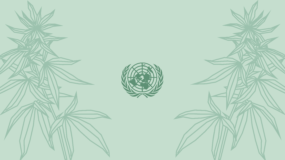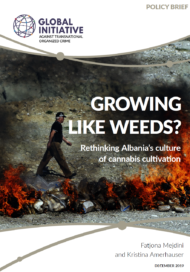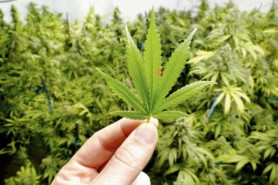Posted on 23 Dec 2020
Cannabis re-classification confirmed in knife-edge vote: A political and historical watershed, but no change for illicit markets
On 2 December 2020 in Vienna, the UN Commission on Narcotic Drugs (CND) – a committee of 53 UN member states – narrowly voted through a technical and incremental but politically significant reform of how cannabis is classified internationally.
In what would have seemed unthinkable only a few years ago, the committee voted in favour of removing cannabis from Schedule IV of the 1961 Single Convention on Narcotic Drugs, which covers controlled substances with limited or no therapeutic benefit, but kept it under general control as a dangerous substance under Schedule I of the Convention. The vote was in favour of a recommendation of the World Health Organization’s Expert Committee on Drug Dependence (ECDD), a technical committee which reviews the public-health impact of psychoactive substances, and regularly makes recommendations to the CND as to how the international community should control specific substances. The vote was passed with 27 countries in favour, 25 against and one abstention.
The vote opens the door for more scientific and medical use of cannabis, but does not change its status as a controlled substance under the international drug-control system, and has no legal impact on how countries may choose to regulate or prohibit recreational cannabis use or possession. In this piece, GI-TOC experts give their analysis on the political and historical significance of the decision and its potential impact on illicit markets.
The politics
Ian Tennant
This vote must be seen in the context of growing moves around the world towards the decriminalization and legalization of cannabis. Among the countries voting in favour, Jamaica (where cannabis use and possession are now largely decriminalized) hailed the vote as a ‘seminal moment’ that served as a ‘reaffirmation of what Jamaica has always known given its long historical and intimate connection with the plant, as a source of traditional medicine’. But other countries with less liberal outlooks on drug policy who voted in favour of the change stressed that their vote should in no way be seen as support for further liberalization. Following the vote, the EU delegation in Vienna explained that the decision ‘should not be seen as a step towards a liberalisation of the use of cannabis or minimising the risks and dangers it represents for our society’. Australia echoed this, stating that ‘Australia does not support the legalisation of cannabis for recreational use. That is not what this vote is about.’
However, it is precisely the risk of perceived support for legalization that those opposed to the decision are worried about. Following the vote, the Russian ambassador in Vienna gave a statement on behalf of a group of like-minded countries, saying ‘We express deep concern that the decision to change the existing scheduling status for cannabis and its related substances may be interpreted as the Commission finding that these substances are no longer regarded as harmful to health, in sharp contrast to the recent scientific findings.’ This was reiterated by Turkey, who said, ‘We continue to believe that there is a high risk to create a wrong public impression as if cannabis and cannabis resin are not dangerous for health.’
The headline of the New York Times report on the vote – ‘U.N. Reclassifies Cannabis as a Less Dangerous Drug’ – appeared to confirm such fears. In part, this may have been due to a lack of guidance: the Secretariat of the CND (part of the UN Office on Drugs and Crime) chose to issue only a technical press statement on the details of the vote, without offering any interpretation of the significance or meaning of the vote, although the official UN News website did offer a balanced interpretation (its headline ran: ‘UN commission reclassifies cannabis, yet still considered harmful’).
Regardless of the headlines, the vote indicates that cannabis is now being treated differently by the international community. In this context, the way that countries voted is particularly interesting.
Showing how attitudes have changed in Europe and North America, some Western countries that were only recently seen as bastions of conservative and prohibitionist policies on drugs voted in favour of the reclassification. Those voting in favour included formerly pro-control Canada (where recreational cannabis is now legalized and regulated) and the United States (leader of the ‘war on drugs,’ but also where a third of Americans currently live in states where cannabis is legal for adult use, and whose lower House passed a Bill on 4 December to decriminalize cannabis use nationally), as well as the United Kingdom and most EU countries.
In recent years, the EU has gained competency over voting positions at the CND (meaning the EU countries in the Commission have to agree a common voting position), so technically all EU member states should have fallen in line with its position to vote in favour, but Hungary broke the EU position and voted against the proposal, in line with its domestic social conservativism. But more surprising to those familiar with the debate was to see countries such as France, the UK and Italy voting in favour of the proposal, given that all have been staunch supporters of the international drug-control regime and cannabis’s place within it.
In Africa, South Africa’s vote in favour is hugely significant. Taken together with the September 2018 Constitutional Court decision (which ruled that the prohibition of the personal use and cultivation of cannabis, by adults, in private spaces is unconstitutional), it confirms a sea change in Pretoria’s position. The conservative kingdom of Morocco also voted in favour, itself a remarkable result. The rest of the African caucus on the committee voted against the proposition, in line with expectations.
In East Asia, Thailand (another socially conservative monarchy) voted in favour, while Japan and China voted against. In Latin America, Mexico, Colombia, El Salvador and Ecuador voted in favour while Chile, Cuba and Peru voted against, reflecting the general split on drug policy that has been apparent in recent years (despite the political changes that have taken place in both Colombia and Mexico). Another very significant result came from South Asia, with both India and Nepal surprisingly voting in favour, while Pakistan and Afghanistan voted against. Overall, there are countries (some of them very socially conservative) who have publicly voted in favour of a small, but concrete, step for drug reform. This weakening of traditional hard-line positions against all kinds of cannabis use reflects a growing recognition by some of these governments of the scientific and medical potential of this substance, but also demonstrates that societal and moral atittudes are shifting.
The discussion leading up to this vote has been drawn out and heated in recent years, demonstrating the political sensitivity of the issue – and the impossibility of divorcing the ‘technical’ recommendations coming from the World Health Organization’s Expert Committee from the wider political debates which are heavily influenced by politics, ideology and social norms. The vote holds up a mirror to changing policies and attitudes in societies around the world, and in turn, this vote will influence public awareness and political debate at the national level in years to come.
The history
Dr John Collins
Cannabis has been regulated at the international level since 1925. Before then, countries such as Egypt, Italy and South Africa had argued strongly for global cannabis prohibition, but often found only lukewarm support at the international level. However, the League of Nations finally accepted their arguments and included cannabis in the 1925 International Opium Convention. As Liat Kozma highlights, initially ‘the US did not play a leading role at all,’ while today ‘the role of Italy, South Africa, Egypt and Turkey in international cannabis prohibition … is largely overlooked’.
But far from imposing an absolute prohibition, the convention sought to limit ‘extracts’ and ‘tinctures’ of ‘Indian Hemp’ to ‘medical and scientific purposes’. Any international trade in such products was to be overseen by an import-export system of monitoring, but ultimately domestic controls remained the prerogative of member states.
Over the following decades, awareness of cannabis grew and countries unilaterally moved towards controls. Despite this trend, many remained wary of drives to internationalize new obligations while the League and then the UN focused on strengthening supply regulations around opium. Eventually, and somewhat grudgingly, the 1961 Single Convention on Narcotic Drugs included expanded controls on cannabis. Import and export authorizations meant that cannabis was restricted within international trade. This remains a key legacy issue and barrier to licit interstate recreational cannabis trades, although does not apply to medical cannabis, which can be legally traded within the current system.
Ultimately, the actual impact of international controls on national policies remains complex, political and contested. There are two legal regimes applying to cannabis under the 1961 Convention: the ‘specific’ regime applies directly to cannabis, alongside specific regimes for opium and coca, while the ‘standard’ regime is encapsulated in the system of scheduling. This applies to all listed drugs which are ‘scheduled’ according to their supposed risk vs therapeutic value ratio.
Cannabis was listed in schedules I and IV. Drugs can be under Schedule I without being under IV, but cannot be under Schedule IV alone. In this sense, Schedule IV operates as a sort of additional and indicative schedule for drugs in Schedule I, and is intended to include those drugs with a higher risk of abuse, not believed to be outweighed by their therapeutic potential.
While some hard-line states envisioned this level of control as an absolute mandate to prohibition, how to interpret Schedule IV was left ‘to the judgement, though theoretically not to the discretion, of each party’. If ‘a Party believed … that special measures were required, but refused to adopt them … it would not be acting in good faith and thus would violate its obligation,’ although any perceived violation could not be legitimately challenged by any other state.
There are complex legal questions around whether the inclusion of certain drugs on Schedule IV implies absolute prohibitions of those substances. The official treaty commentaries are unequivocal that it does not. Firstly, there is no obligation under international treaty law to criminalize possession or use of cannabis. As the official UN Commentary states, the 1961 Convention ‘does not include possession for personal consumption,’ which is ‘left to the discretion of each Party’. Regarding cultivation, it was left to the ‘judgement, though theoretically not to the discretion, of each party,’ depending on whether they believed the party in question could limit cultivation within the medical and scientific terms of the convention.
What are these ‘medical and scientific’ terms? As Francisco Thoumi points out, no one knows. The convention adopted a cultural relativist position around the key licit–illicit dividing line, recognizing that there was no consensus understanding of the terms. They thereby left an opening which member states could, and now have, walked through. As some scholars and now member states have posited, surely policy experimentation (for example, in the form of rigorously monitored cannabis legalization) falls within a modern conception of social ‘scientific’ investigation and is thereby permissible, within reason. Although legally regulated recreational markets challenge core tenets of the convention, countries currently claim that the conventions have implicit flexibilities, or that they are pursuing achievement of the purposes of the treaties in realistic ways. As more and more countries pursue diverse domestic implementation, less and less discussion is devoted to the legal tensions with the international drug-control system. This widening divergence between international and national laws is unlikely to be resolved, and may slowly render many of the international provisions of the conventions irrelevant.
Possible impact on illicit markets
Jason Eligh
While the CND’s vote was significant in its demonstration of political transition of some member states, from historical acquiescence to the Vienna-based consensus of prohibition to support of cannabis reclassification, the practical consequence of the decision is as yet undetermined.
It could be argued that this vote simply serves to reinforce the fact that the dated UN drug-control machinery of the CND is capable only of incremental change, with little consequent impact. Although reclassified, cannabis remains still prohibited under the international drug conventions – and no change in the legal status of cannabis means no change in the illicit market for it. After all, it is the illegality of cannabis that is a principal structural foundation for the creation and perpetuation of the criminal markets that exist around it. Cannabis is the most widely used substance under international control – at least 263 million people around the world use cannabis in some form – and in most places the only way to acquire it is through the illicit retail market. Despite decades of prohibition, millions of arrests and tonnes of seizures, the global illicit market for cannabis has only continued to grow. The vote changes nothing in this regard.
Further, the idea that the reclassification is a means to make scientific research into cannabis and its related compounds easier is mildly gratuitous. After all, the world that exists outside of the Vienna International Centre saw 563 clinical trials of cannabis or its related compounds – including CBD, the subject of one of the CND’s rejected proposals – in 2019 alone. Legal cannabis, medicinal or otherwise, is already an immensely profitable sector: the world’s legal cannabis market has a projected valuation of US$104 billion by 2024, of which US$63 billion is for medical cannabis products, with US$41 billion for recreational cannabis use. Uruguay and Canada already have a legalized and regulated domestic recreational cannabis market, while South Africa is in the process of setting up a similar system. At least 40 more countries have legalized the cultivation, sale, possession or use of cannabis for medical purposes, and still more have de jure or de facto decriminalized the possession or use of cannabis within their own borders.
Considering this reality, it would appear that the trajectory of drug control around cannabis has been decided already through the unilateral policy actions and practices of individual member states. Thus this UN vote to reclassify cannabis is inconsequential by comparison.
Ultimately, the significance of this vote rests in its simple reaffirmation of the existence of substantive cracks in the foundation of international drug-control politics. The so-called Vienna Consensus is eroding and more member states are feeling confident to break openly with its aging principles. Now more than ever, there is hope that the science and reality outside of Vienna might finally influence the tired politics and practices that continue to exist within.



